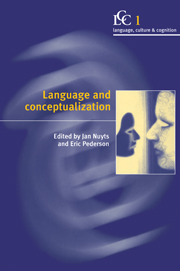
-
Select format
-
- Publisher:
- Cambridge University Press
- Publication date:
- 05 June 2012
- 15 May 1997
- ISBN:
- 9781139086677
- 9780521553032
- 9780521774819
- Dimensions:
- (228 x 152 mm)
- Weight & Pages:
- 0.599kg, 292 Pages
- Dimensions:
- (228 x 152 mm)
- Weight & Pages:
- 0.47kg, 292 Pages
- Series:
- Language Culture and Cognition (1)
You may already have access via personal or institutional login- Series:
- Language Culture and Cognition (1)
Book description
To what extent is conceptualization based on linguistic representation? And to what extent is it variable across cultures, communities, or even individuals? Of crucial importance in the attempt to develop a comprehensive theory of human cognition, these remain amongst the most difficult of questions in the cognitive sciences. This volume brings together ten new contributions from leading scholars working in a wide cross-section of disciplines, including linguistics, anthropology, psychology, and philosophy, with an introduction by the editors which surveys current work in the field. It is one of the first attempts to tackle explicitly the issue of the relationship between linguistic and conceptual representation from a truly interdisciplinary perspective.
Reviews
"I recommend this book to anthropologists interested in language or cognition. ...all of the chapters provide succinct statements of general theory, detailed ethnographic observations, or interesting experimental results." Gary B. Palmer, American Anthropologist
"...the book is of interest to anthropological linguists interested in the relavance of our work to cognitive science." Malcah Yaeger-Dror, Language in Society
Contents
Metrics
Altmetric attention score
Full text views
Full text views help Loading metrics...
Loading metrics...
* Views captured on Cambridge Core between #date#. This data will be updated every 24 hours.
Usage data cannot currently be displayed.
Accessibility standard: Unknown
Why this information is here
This section outlines the accessibility features of this content - including support for screen readers, full keyboard navigation and high-contrast display options. This may not be relevant for you.
Accessibility Information
Accessibility compliance for the PDF of this book is currently unknown and may be updated in the future.


